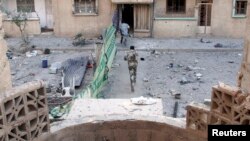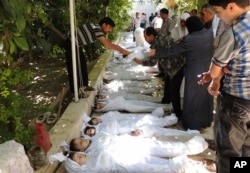A White House official says the U.S. has a "range of options" if it decides to act against Syria's alleged use of chemical weapons.
The official commented on Saturday as President Barack Obama met with his top national security advisers to discuss the Syrian government's alleged use of chemical weapons on civilians in a Damascus suburb.
Obama has previously expressed reluctance to any U.S. troop presence in Syria.
However, U.S. Defense Secretary Chuck Hagel has strongly suggested that the U.S. is moving naval forces into place in the region in anticipation of any decision the president may make concerning Syria.
Hagel told reporters Obama has asked the Defense Department for a range of options if he chooses to launch an attack on the Damascus government.
The Pentagon chief was speaking on Friday, a defense official said the U.S. Navy is expanding its presence in the Mediterranean, sending in a fourth warship armed with cruise missiles.
The U.S. and other world powers have been pushing for a United Nations-led investigation of the chemical-weapons allegations, and a top U.N. official arrived in Damascus Saturday to push for access to the site where rockets loaded with poison gas were launched.
The U.N. high representative for disarmament affairs, Angela Kane, is seeking an investigation of the incident. The Syrian government denies that it used any chemical weapons against rebels who have been fighting against the government of President Bashar al-Assad for more than two years. Many international leaders say they suspect the Syrian government is guilty of using banned chamical weapons, but Russia has spoken out in defense of the Assad regime.
Syrian opposition leaders and activists have released video of large numbers of bodies - many of them young children - that bear no signs of physical violence of blood. Those pictures, and separate scenes from hospitals showing patients writhing in agony without apparent wounds - are said to be persuasive indications that they were victims of a attack that used nerve gas or some other deadly chemical agent.
The government says any blame lies with the rebel side. The state-run SANA news agency reports a number of soldiers suffocated and died Saturday in a Damascus neighborhood where "armed terrorists used chemical weapons."
The news agency said the "terrorists" were engaging in "violent clashes" in the area.
Russia and China have joined the U.S., Francer, Britain and other Western powers in calling for a thorough investigation of the recent events in Syria.
Although Russia was quick to endorse the Syrian government charge that rebels used poison gas on their own supporters, Moscow's foreign ministry also has called on Syria to cooperate with the U.N.
Iran's new president, Hassan Rouhani, has for the first time condemned the use of chemical weapons in Syria. State-controlled media in Tehran report he did not assess blame against either side in his comments on Saturday. Iran is Syria's ally, and its foreign ministry has previously said evidence indicates that Syrian rebels launched the attack.
The official commented on Saturday as President Barack Obama met with his top national security advisers to discuss the Syrian government's alleged use of chemical weapons on civilians in a Damascus suburb.
Obama has previously expressed reluctance to any U.S. troop presence in Syria.
However, U.S. Defense Secretary Chuck Hagel has strongly suggested that the U.S. is moving naval forces into place in the region in anticipation of any decision the president may make concerning Syria.
Hagel told reporters Obama has asked the Defense Department for a range of options if he chooses to launch an attack on the Damascus government.
The Pentagon chief was speaking on Friday, a defense official said the U.S. Navy is expanding its presence in the Mediterranean, sending in a fourth warship armed with cruise missiles.
The U.S. and other world powers have been pushing for a United Nations-led investigation of the chemical-weapons allegations, and a top U.N. official arrived in Damascus Saturday to push for access to the site where rockets loaded with poison gas were launched.
The U.N. high representative for disarmament affairs, Angela Kane, is seeking an investigation of the incident. The Syrian government denies that it used any chemical weapons against rebels who have been fighting against the government of President Bashar al-Assad for more than two years. Many international leaders say they suspect the Syrian government is guilty of using banned chamical weapons, but Russia has spoken out in defense of the Assad regime.
Syrian opposition leaders and activists have released video of large numbers of bodies - many of them young children - that bear no signs of physical violence of blood. Those pictures, and separate scenes from hospitals showing patients writhing in agony without apparent wounds - are said to be persuasive indications that they were victims of a attack that used nerve gas or some other deadly chemical agent.
The government says any blame lies with the rebel side. The state-run SANA news agency reports a number of soldiers suffocated and died Saturday in a Damascus neighborhood where "armed terrorists used chemical weapons."
The news agency said the "terrorists" were engaging in "violent clashes" in the area.
Russia and China have joined the U.S., Francer, Britain and other Western powers in calling for a thorough investigation of the recent events in Syria.
Although Russia was quick to endorse the Syrian government charge that rebels used poison gas on their own supporters, Moscow's foreign ministry also has called on Syria to cooperate with the U.N.
Iran's new president, Hassan Rouhani, has for the first time condemned the use of chemical weapons in Syria. State-controlled media in Tehran report he did not assess blame against either side in his comments on Saturday. Iran is Syria's ally, and its foreign ministry has previously said evidence indicates that Syrian rebels launched the attack.






